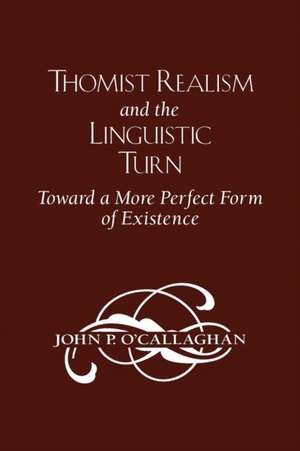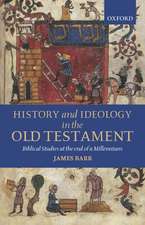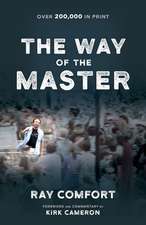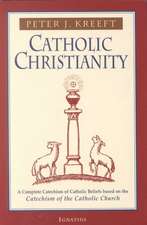Thomist Realism and the Linguistic Turn – Toward a More Perfect Form of Existence
Autor John P. O′callaghanen Limba Engleză Paperback – 14 sep 2016
Philosophers will be richly rewarded by reading John O’Callaghan’s new book, Thomistic Realism and the Linguistic Turn. Based on his broad knowledge of Aristotle and Aquinas, O’Callaghan provides not only an excellent treatment of Aquinas’s epistemology but also a superb demonstration of just how Aquinas might contribute to contemporary debates. Traditionally, the camps of realism and idealism fiercely engaged one another in the field of epistemology. Thomists participated in confronting idealism from their unique realist position. Post-Wittgenstein, the conflict has been dominated by a form of epistemology that grounds all knowledge in linguistic practice. Since Thomists work in a textual and historical mode, their response to the technical approach of the analytic philosophy in which most of the linguistic epistemologists write has been slow in coming. O’Callaghan expertly closes that gap by successfully bringing together these fields.
Preț: 346.93 lei
Nou
Puncte Express: 520
Preț estimativ în valută:
66.39€ • 69.06$ • 54.81£
66.39€ • 69.06$ • 54.81£
Carte tipărită la comandă
Livrare economică 15-29 aprilie
Preluare comenzi: 021 569.72.76
Specificații
ISBN-13: 9780268042189
ISBN-10: 0268042187
Pagini: 370
Dimensiuni: 152 x 228 x 24 mm
Greutate: 0.54 kg
Ediția:1
Editura: MR – University of Notre Dame Press
ISBN-10: 0268042187
Pagini: 370
Dimensiuni: 152 x 228 x 24 mm
Greutate: 0.54 kg
Ediția:1
Editura: MR – University of Notre Dame Press
Recenzii
"This is a magnificent tour de force that engages head-on the attacks upon (and defence of) mental representationalism as the dominant epistemology of the modern period. . . . [T]his work constitutes the closest approximation currently available to a definitive 'map of the territory' of Anglo-American analytic epistemology, its fatal affiliation to the Cartesian theory of ideas, and a most persuasive argument for the distinctness of the Aristotelian-Thomist approach. [A] splendid achievement." —The Heythrop Journal
“O’Callaghan offers an interpretation of Aquinas that is simultaneously traditional and innovative. [This] book undertakes a worthy effort to revitalize the traditional interpretation of Aquinas’s theory of cognition so that it can engage the contemporary debate about the relationship of language and thought to the world. His argument is timely . . . and it makes an important contribution to the field.” —The Thomist
“[This] is an important and useful book . . . [that] renders a valuable service from Thomistic resources to contemporary thinkers struggling with the perennial problems of realism and anti-realism in Western thought.” —Theological Studies
"O'Callaghan writes as a passionate, penetrating, and faithful reader of St. Thomas. Thomists will have no difficulty recognizing the basic theses, but they will profit by following the careful development of these theses in dialogue with a number of contemporary philosophers." —Review of Metaphysics
“[This] is an important and useful book . . . [that] renders a valuable service from Thomistic resources to contemporary thinkers struggling with the perennial problems of realism.”
Notă biografică
John P. O'Callaghan is director of the Jacques Maritain Center and associate professor of philosophy at the University of Notre Dame. He is co-editor of Recovering Nature: Essays in Natural Philosophy, Ethics, and Metaphysics in Honor of Ralph McInerny, also published by the University of Notre Dame Press.











